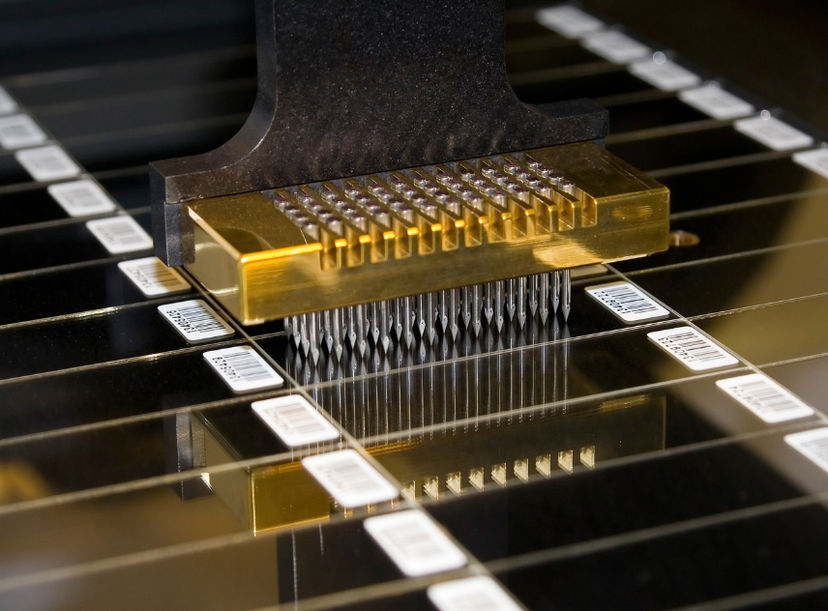Multiplex immunoassays advance personalized cancer therapy
See how to leverage multiplex immunoassays and proteomic profiling to enhance cancer diagnosis and treatment
11 Apr 2025

Microarray printer
Cancer therapy has made significant strides in recent years, mainly due to the development of more personalized treatment approaches. One of the key tools in this customized approach is the multiplex immunoassay, a powerful technique that simultaneously measures multiple biomarkers in a single sample. RayBiotech is spearheading this innovation with its high-density antibody arrays, revolutionizing how cancer is diagnosed and treated.
The role of proteomic profiling in personalizing cancer therapy
Choosing the optimal therapeutic regimen for cancer patients is a complex task that typically involves a combination of various treatments, including chemotherapeutic agents, targeted therapies, immunotherapy, and other modalities. While oncogenetic mutations – genetic alterations that drive cancer development and progression – have been instrumental in guiding treatment decisions, they do not always provide a complete picture.
Cancer is not purely driven by genetic alterations; it is also profoundly influenced by changes in protein expression, which can vary significantly between patients and even regionally within different regions of the same tumour. These altered protein expression patterns are crucial to understanding how a tumour will likely behave and respond to treatment.
As a result, there is a growing recognition that proteomic profiling – analyzing the complete set of proteins expressed by a cell, tissue, or organism – can provide invaluable insights for personalizing cancer therapy. By identifying specific proteins associated with treatment response, clinicians can tailor therapeutic regimens more precisely, potentially improving patient outcomes and reducing the likelihood of treatment resistance.
Benefits of using multiplex immunoassays in cancer research
As personalized medicine advances, cutting-edge technologies play a crucial role in enabling more precise and effective cancer therapies. Multiplex immunoassays, a type of immunoassay that can simultaneously measure multiple analytes (such as proteins) in a single experiment, have emerged as a powerful tool in proteomics.
These assays provide a comprehensive snapshot of the proteome, enabling the detection and quantification of multiple targets within a small volume of biological material, such as blood, serum, or cell lysate. This is particularly advantageous when dealing with limited or precious samples.
Additionally, multiplex immunoassays are low-cost, time-efficient, flexible, and designed for high-throughput screening, making them ideal for large-scale studies or clinical diagnostics requiring rapid sample analysis.
How multiplex immunoassays work
Multiplex immunoassays use solid supports like beads or microarrays coated with capture antibodies specific to the analytes of interest. When a sample is introduced, the target analytes bind to these antibodies. A secondary detection antibody, often labeled with fluorescent dye or enzyme, is then added to generate a detectable signal. Instruments such as flow cytometers or array imaging systems simultaneously measure the signals from all analytes, enabling the analysis of multiple targets in a single assay.
In cancer research, multiplex immunoassays have proven crucial for profiling protein expression in tumor samples, helping to identify biomarkers for cancer diagnosis, prognosis, and treatment response. This detailed molecular profiling supports the development of more effective and personalized therapies.
Moreover, in drug development, these assays assess the pharmacodynamics of new therapeutics by monitoring biomarker level changes in response to treatment. This provides valuable insights into drug efficacy and safety, aiding in the optimization of therapeutic strategies.
Cancer research optimization with RayBiotech Quantibody® Kiloplex arrays
Multiplex immunoassays are invaluable in cancer research and essential to understanding the complex interplay between different proteins. They help identify biomarkers, predict treatment responses, and develop new therapies.
RayBiotech has refined this technology with their Quantibody Kiloplex arrays, allowing researchers to measure the expression levels of up to 1,000 different proteins in a single sample. This capability especially benefits cancer research, as it facilitates mapping and predicting responses to various cancer therapies.
The Quantibody Kiloplex arrays have been successfully employed in numerous studies, helping researchers uncover the molecular mechanisms underlying treatment efficacy and resistance. By enabling comprehensive protein profiling, these arrays pave the way for more personalized and effective therapeutic strategies, ultimately contributing to the advancement of cancer treatment.
Case study 1: Mapping the tumor microenvironment to optimize treatment
A recent study by Hu et al., published in Cancer Cell, emphasizes the critical role of proteomic profiling in understanding the tumor microenvironment and its impact on treatment response. The research focused on three distinct subtypes of cancer-associated fibroblasts (CAFs) derived from non-small cell lung cancer (NSCLC) patients. CAFs are essential components of the tumor stroma, significantly influencing tumor progression and response to therapy.
The study uncovered that CAFs are functionally heterogeneous, with different populations exerting varied effects on tumor behavior and therapeutic outcomes. This functional diversity, driven by intrinsic TGF-β signaling pathways regulating HGF and FGF7 expression, was closely linked to patient responses to targeted therapies. Notably, the researchers found that traditional markers were inadequate for distinguishing CAF functions due to significant variability in marker expression among CAF subtypes.
By employing a customized high-density Quantibody array for proteomic profiling, the study identified specific protein signatures within CAFs that correlated with treatment response. These findings suggest that CAF heterogeneity could serve as a novel biomarker for personalized therapy. For instance, patients with tumors containing a high proportion of CAFs with a particular protein expression profile might benefit from targeted therapies that modulate the tumor microenvironment.
This case study illustrates how advanced proteomic tools like RayBiotech’s high-density antibody arrays can provide valuable insights into the tumor microenvironment, paving the way for more personalized and effective cancer treatments.
Case study 2: Predicting response to immune checkpoint inhibitors
The use of immune checkpoint inhibitors (ICIs) has revolutionized the treatment of several cancers, including NSCLC. However, not all patients respond to ICIs, and there is an urgent need for predictive biomarkers that can identify those who are most likely to benefit from this therapy.
A study by Harel et al., published in the Journal for ImmunoTherapy of Cancer, addressed this challenge by analyzing the plasma of 143 NSCLC patients on ICI therapy using RayBiotech’s Quantibody Kiloplex arrays. Proteomic profiling of around 800 plasma proteins, combined with machine learning, led to the discovery of a predictive signature involving two proteins – CXCL8 and CXCL10 – and two clinical parameters – age and sex - effectively distinguishing between responders and non-responders to ICI therapy. Further analysis revealed three distinct patient clusters with varying clinical and biological characteristics, including differential protein expression and neutrophil activity. Notably, patients who did not respond to therapy had significantly higher plasma levels of specific proteins, particularly those related to neutrophils.
This research demonstrates the potential of plasma proteomic profiling as a tool for predicting responses to ICI therapy in NSCLC. The identified biomarkers and patient clusters provide a deeper understanding of the factors influencing treatment resistance and pave the way for more personalized approaches in immuno-oncology.
The findings offer a framework for integrating host and tumor factors into predictive models, which could enhance the precision of immunotherapy treatments in NSCLC and potentially other cancers.
Advanced proteomic tools transform cancer treatment
Integrating multiplex immunoassays and proteomic profiling into cancer research marks a significant advancement in personalized therapy. Technologies like RayBiotech’s Quantibody Kiloplex arrays allow for simultaneous analysis of multiple biomarkers, providing a detailed view of protein expression that influences cancer progression and treatment response.
The highlighted case studies demonstrate these tools' impact, from optimizing treatment based on tumor microenvironment to predicting responses to immune checkpoint inhibitors. As personalized medicine advances, precise protein profiling and biomarker identification will be essential for developing targeted therapies, enhancing patient outcomes, and advancing cancer treatment.
References
Harel M, Lahav C, Jacob E, Dahan N, Sela I, Elon Y, et al. Longitudinal plasma proteomic profiling of patients with non-small cell lung cancer undergoing immune checkpoint blockade. Journal for ImmunoTherapy of Cancer. 2022 Jun;10(6):e004582
Hoeben A, Joosten EAJ, van den Beuken-van Everdingen MHJ. Personalized Medicine: Recent Progress in Cancer Therapy. Cancers. 2021 Jan 11;13(2):242.
Hu H, Piotrowska Z, Hare PJ, Chen H, Mulvey HE, Mayfield A, et al. Three subtypes of lung cancer fibroblasts define distinct therapeutic paradigms. Cancer Cell. 2021 Nov 8; 39(11):1531-1547.e10.
